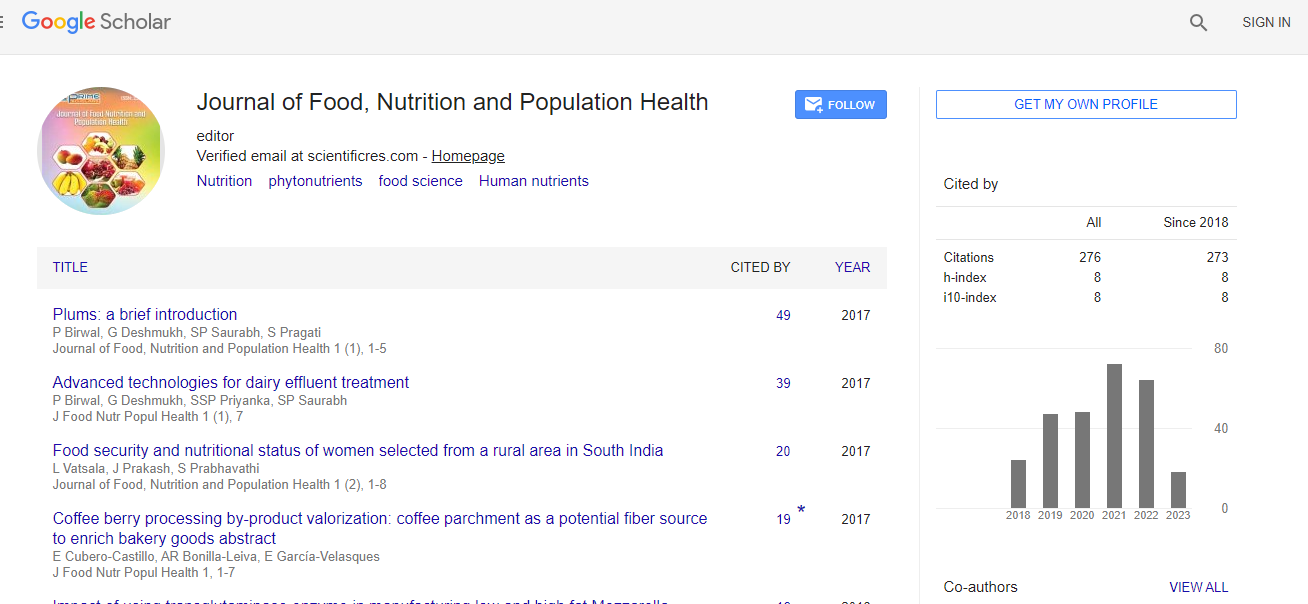Ann Kany*
Department of Nutitional Science, Food and Nutrition University, Nigeria
- *Corresponding Author:
- Ann Kany
Department of Nutitional Science, Food and Nutrition University, Nigeria
Tel: 7995435408
E-mail: annkanny.267@gmail.com
Received Date: June 02, 2021; Accepted Date: June 03, 2021; Published Date: June 18, 2021
Citation: Kany A (2021) Detection of Species Adulteration in Meat Products and Mozzarella-type Cheeses Using Duplex PCR of Mitochondrial. J Food Nutr Popul Health. Vol.5 No.6:61.
Editorial
Food beginning validation is basic for customer security. This investigation investigated meat and milk species identification as a spearheading country‐specific report on mis labeling predominance among handled meat and milk items in Bangladesh. Meat items marked as chicken or hamburger and Mozzarella‐type cheeses (25), made in Bangladesh and of abroad starting points, were dissected for spe-cies discovery. Two duplex PCRs (cattle‐buffalo and chicken‐pig) were applied with species‐ specific mitochon-drial Cyt bgene groundworks and discovered to be exact for species ID in meat and milk products. Bangladeshi beginning beef‐labeled items were discovered to be blended in with bison (n=2) and chicken (n=5) suggesting dependent upon 33% of items may be mis labeled. Such mis labeling would permit these 'beef' products to charge a greater cost contrasted and chicken items that order a lower cost. Imported meat products were likewise found mislabeled with wild ox and chicken. Cheddar tests, announced as ox-like, were found to con-tain wild ox DNA, and no steers or bison DNA was found in six imported cheddar tests. All the meat and cheese items were Halal, as none contained pig DNA. This pilot study shows most of items were labelled accurately, yet enormous extents were not and exacting observing is prescribed to guarantee food safety and address customer inclinations, particularly strict concerns.
Verification of announced species in meat items was high-lit across global business sectors when horse meat was reported in in any case marked meat items by the Food Safety Authority of Ireland and, thereafter, pork as a debasement across Europe. Pony meat has likewise been distinguished in ground meat (mince)sold in the US. In Bangladesh, these examplesset off Halal verification of imported frozen meat nudge ucts, as a worldwide exchange standard. In the dairy business, use of cheaper milk is likewise typical, however not generally pronounced. Forinstance, reported species defilement in Mozzarella, which ought to be made with milk from Italian Mediter-ranean water wild ox (Bubalus bubalis), recognizing the presence of bovine milk (more affordable) as a debasement/mislabeling. Molecular advancements have given an advancement system for species identification in food confirmation. Utilization of DNA‐based marker sand the now widespread polymerase chain response (PCR) in molecular authentication permit firmly related creature species to be identified, and if so wanted measured, in handled food including meat, fish and cheddar (Lo and Shaw, 2018). In spite of the fact that protein‐based technique such as ELISA have been utilized for species ID, proteins are significantly corrupted during preparing while DNA is more stable.
Supposedly, this is a spearheading examination of labeled animal categories utilizing PCR in meat items and cheeses sold in Bangladesh. Quick and delicate customary PCR procedures were utilized for species ID in both home grown and imported frozen meat push ucts and Mozzarella‐type cheeses. Meat items, named as hamburger were picked on the groundsthatmeatis exorbitant(~7 USD). The approach might likewise be utilized to distinguish item that contain hamburger and are, there-front, not appropriate for of the Hindu religion and are debased with cheaper meats, like chicken (1.7-2.5 USD) and wild ox (~4.0 USD). The presence or nonappearance of pork was additionally tested to decide Halal realness. The greater part of the Bangladeshi cheeses selected were marked as produced using cows milk, albeit some dairy farms additionally produce bison milk. Consequently, there is the potential for adul-teration, incidental or intentional, during creation. Furthermore, some imported cheeses didn't announce milk species (marked as new milk). Thus, our investigation planned to confirm both meat and milk starting points used in chose frozen meat items and cheeses, individually, based on amplification of species‐specific mitochondrial cyt b gene.

